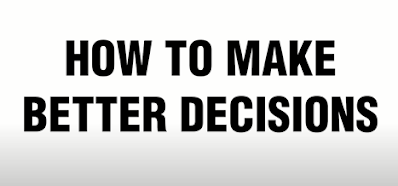How To Make Better Decisions - 12 Decision Making Tips
How To Make Better Decisions - 12 Decision Making Tips
The decisions we make play a vital role in our lives. In many ways, they shape our future. Yet, most people aren’t really conscious of just how impactful many of their decisions actually are. They go through life without paying much attention to their thoughts or actions. Of course, we cannot control everything that happens to us; but we can still make decisions that align with our life’s goals. That said, you may feel very uncertain about how to make decisions that will steer your career, health, financial situation and relationships in the direction you want. If this rings true for you, then you may want to improve your decision-making process. Here are some effective tips to make better decisons!
Number 1 - Outline The Issue
It is difficult to make a good decision if you are not clear about what the issue really is! Clearly outlining the issue will help you focus on what you are really deciding on, while excluding unrelated aspects. Start with a simple statement like: “What I need to decide is ….,” and also ask yourself why the decision is necessary or advantageous, and what is motivating you. Doing this will help you realize the effect your decision will have. Maybe you are considering buying a new car. Why do you want it or need it? Can you afford it? Are you willing and able to make the necessary payments? Understanding the important issues involved can help you make better decisions.
Number 2 - Take Control Of Your Emotions
What you are feeling about an issue can affect your decisions. It is therefore, important that you recognize what you are feeling, and deal with your emotions. Fear or uncertainty can lead you to avoid risk, and this can also affect other areas of your life. If you are anxious about signing a loan agreement, for example, you might also shy away from other, less risky decisions - like: whether you should actually ask for that raise you might deserve. If however, you are an excitable person, you may be entirely too optimistic about your prospects. You might take big risks - no matter how small the chances of success - if the profit is big enough. Gambling is a typical example of such behavior. So consider whether you are feeling depressed, excited, fearful, or maybe overly optimistic. Really think about how these feelings might be affecting your decision-making process.
Number 3 - Avoid Information Overload
People like to think that they are making informed decisions. And why not? It certainly makes sense! Yet many get stuck constantly gathering information in order to be as certain as possible aboutany particular decision. This can lead to putting off the decision indefinitely. At any point, take stock of the information you have, and decide what information is most useful toward making a decision. It’s helpful to differentiate what information is essential and what is not. If you catch yourself agonizing over a decision, clear your mind of it for a while. Do anything to get your mind off it. This will give your brain a chance to refocus on the essentials.
Number 4 - Don't Rely On Other People’s Opinions
If you ask others what YOU should do, you will most likely get conflicting opinions, and this can make it even more difficult for you to decide what is best - for you. Other people, after all, will analyze an issue based on their own values.
And the more outside opinions you gather, the more confused and uncertain you will feel. There are exceptions of course. It is perfectly OK to talk with people who will be affected by your decision. It’s important to take them into account before you make a decision.
Number 5 - Make Decisions Compatible With Your Values
Decisions that are in alignment with your core values will also motivate you to make them work. Any time you make an important choice that is NOT in line with your personal priorities or deeply felt principles, you will not be convinced of the rightness of your decision. However, before you can do this, you need to really think about what your core principles and values are. Getting a clear idea of what is really important to you is vital! Write down those values that you feel most deeply about. Once you’ve done that, you can judge whether your decisions align with them or not.
Number 6 - Distance Yourself From The Decision
If you are too personally involved, any decision can be difficult to make. So, try to view the issue from a third person perspective. Imagine that it is someone else’s decision. This will enable you to see issues more dispassionately. Let’s say for example, you are considering whether you should quit your job and begin another career. Pretend that you are advising someone else as to what decision he or she should make. By stepping back and looking at the issue from a more disinterested perspective, you will be able to analyze the situation without feeling directly involved - and therefore, be able to make a more sober assessment of the possible results of any decision. Using this technique will also help you keep your emotions in check.
Number 7 - Weigh Both Risks And Rewards
Every decision promises a desired outcome, but also comes with potential risk. When you are considering a decision, make a list of potential outcomes, both positive and negative. You should also consider how other people may be affected. For every decision there are pros and cons. Although almost no decision you make will be without risk, make sure your decision promises results where the positive effects exceed the negative. Let’s say, that you are considering buying a new house. The pros of such a purchase could be that you will have more space, live in a better neighborhood and can take advantage of low mortgage rates. The cons could include an increase in monthly expenditures. You may also consider what effect it might have on your overall financial situation. What are the worst things that can happen as a result of your decision? What are the clear advantages? Also, what can happen if you don’t make any decision at all? Be aware that making no decision, is a decision in itself!
Number 8 - Avoid Typical Pitfalls
The way you think and choose can negatively affect the quality of your decisions. Even after you’ve outlined the issue; get useful information; and consider the pros and cons - you can still make a bad decision! It is important for you to detect your typical tendencies and pre-conceived ideas that can affect the way you make decisions. It is often everything but easy to make changes. Yet a decision that takes you out of your comfort zone and represents a new direction is usually the best. Don’t make a decision just because you’re comfortable with it. We often seek information that merely confirms what we already want to do. This phenomenon is called “confirmation bias”. Gather information - no matter how disturbing it may seem, and really look at all aspects of the decision you are facing.
Number 9 - Create An Action Plan
Simply deciding on something is not enough. You should formulate the steps you need to take, in order to realize your decision. Your action plan should also have a timeline for each step, as well as how you will integrate other people who are affected by your decision. For example, if you decide to go on vacation, that may require you to take care of a number of things. You need to inform your employer well in advance and make sure that your tasks are covered in your absence. You should probably check your available finances and perhaps save some money. You should also plan your actual trip, book accommodations - and set a schedule for getting all of this done.
Number 10 - Commit To Your Decision
Don’t procrastinate or reconsider your decision. You’ve decided, so get going! Dedicate yourself to making your decision work. If you are hesitant because you are unsure of your decision or are considering various options or changes, then your decision has not accomplished anything.
DECIDE, then DO.
Making a decision can be very difficult. Because you want to get it right, you may spend an endless amount of time considering just what you should do. If however, you do not follow through, you will not enjoy the rewards that your decision can bring you. If you wait too long thinking about whether to apply for that new job, for instance, someone else may fill out the application and get the job. You will miss out!
Number 11 - Have A Backup Plan
You won’t make the best decision every time. Nobody does. Sometimes, a lack of time or information may force you to make hasty or uninformed decisions. Having said that, you probably consider a number of options when making a decision. So, if your decision does not work out as you hoped, you may have the chance to “do it over” and try out another option, or just start the decision-making process anew.
Number 12 - Assess Your Decisions
People often neglect to think about their past decisions. However, analyzing and evaluating past decisions can help you make better ones in the future. When you examine your decisions, you will be able to identify which ones went well, which ones did not - and most importantly - why. This will help you when you consider your next decision. Ask yourself questions like: Was I satisfied with the result of my decision? Could I have done something differently or better? What can I learn from it? Learning how to make better decisions can significantly improve how you live your life. If your decision-making process is efficient, you will be able to make faster decisions and feel much more confident about them. You will save time and spare yourself a lot of agony. As you can see from these tips, you CAN actually become a better decision-maker. Even applying just a few of these steps will lead to better decisions! So, what’s YOUR decision-making process like? Are you impulsive?
Do you think things through? 🤔 Do you procrastinate a lot? We wanna know! Share your thoughts and comments below! If you found this article helpful, SHARE it with your friends, maybe it can help them as well. For more articles like this, pin to our blogsite, and don’t forget to turn on the notification. Also, be sure to check out our other blogs as well.
Thanks for Reading!




Comments
Post a Comment